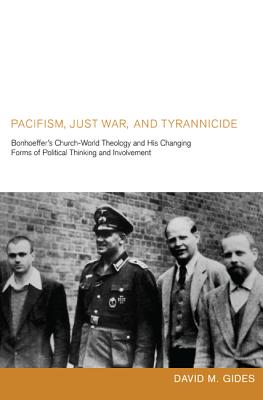Dietrich Bonhoeffer’s perplexing and controversial shift from admitted pacifism to tyrannicide has been the source of scholarly and popular inspiration and criticism. How could an admitted Christian pacifist be involved in a plot to assassinate a political figure? Is there a way to understand and explain this phenomenon comprehensive enough to encompass all relevant data? One that takes into account the nuances of Bonhoeffer’s theology and all of the elements of his complex historical and personal contexts? This study attempts to offer an explanation by linking Bonhoeffer’s political thinking and action with his understanding of the church-world relationship and by evaluating the changes in that thought-action dyad as his life progressed. What emerges is a portrait of a bold and visionary thinker and political agent whose church-world theology, while discontinuous, is consistent enough to be authentic and yet flexible enough to meet the extraordinary challenges presented by Nazism and its intrusion into the churches. Gides suggests that it is actually Bonhoeffer’s malleable church-world thinking that ultimately distinguishes him from his theological and ecclesial contemporaries and even from the mass of German church persons and citizenry; it allowed him to confront evil by reaching beyond the constraints of traditional Lutheran thinking.
| FindBook |
有 1 項符合
Pacifism, Just War, and Tyrannicide: Bonhoeffer’s Church-World Theology and His Changing Forms of Political Thinking and Involv的圖書 |
 |
Pacifism, Just War, and Tyrannicide: Bonhoeffer’s Church-World Theology and His Changing Forms of Political Thinking and Involv 作者:Gides 出版社:Pickwick Publications 出版日期:2012-03-02 語言:英文 規格:平裝 / 422頁 / 22.6 x 15 x 2.3 cm / 普通級 |
| 圖書館借閱 |
| 國家圖書館 | 全國圖書書目資訊網 | 國立公共資訊圖書館 | 電子書服務平台 | MetaCat 跨館整合查詢 |
| 臺北市立圖書館 | 新北市立圖書館 | 基隆市公共圖書館 | 桃園市立圖書館 | 新竹縣公共圖書館 |
| 苗栗縣立圖書館 | 臺中市立圖書館 | 彰化縣公共圖書館 | 南投縣文化局 | 雲林縣公共圖書館 |
| 嘉義縣圖書館 | 臺南市立圖書館 | 高雄市立圖書館 | 屏東縣公共圖書館 | 宜蘭縣公共圖書館 |
| 花蓮縣文化局 | 臺東縣文化處 |
|
|
圖書介紹 - 資料來源:博客來 評分:
圖書名稱:Pacifism, Just War, and Tyrannicide: Bonhoeffer’s Church-World Theology and His Changing Forms of Political Thinking and Involv
|











